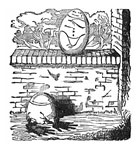
Tremors in the Foundation of the U.S. Catholic Church
A PRIEST FROM ENGLAND REFLECTS
Thinking about the Catholic Church in the U.S., a metaphor keeps coming to mind: “We seem to be at sea.” This image conveys the sense of having lost our bearings, of having been blown off course. Vatican II charted a new course for the Church. There was excitement in the air: We were on the move and we knew where we were headed. But now, some 30 years into the journey, we seem to be “at sea” and the passengers on the Ark of Peter, notably Americans, are asking some serious questions, especially of those who are supposed to be crewing this ship. Read the letters in America’s Catholic newspapers. They reflect the confusion and distress of many ordinary Catholics. Above all, they seem to be saying that American Catholics do not know what they are doing or where they are going.
These questions seem to be coalescing around one central question: “What is our Catholic identity?” The issue is being raised regarding schools, hospitals, and local church life. What distinguishes being Catholic from being anything else? Do we know who we are any longer? Of particular importance is the sense that the Catholic Church in the U.S. is fragmenting. I wonder: Are American Catholics any longer united around a fundamental set of beliefs and values such that they can recognize each other as being of the same body? Furthermore, can they recognize that body as being part of the universal Catholic Church with her center in Rome?
Since I arrived in the U.S. from England in 1976, I have been a chaplain to a nursing home and a college. I have been a therapist in a rehabilitation center for priests, done parish work, taught in a seminary, traveled the country giving workshops in pastoral counseling and spiritual direction, and am currently an associate pastor in a parish in the Southwest. In trying to preach and teach the faith in all these settings, I have come up against the fact of differences. Some were not unexpected. I knew there would be legitimate cultural differences. I also expected there would be differences in religious expression, and so there were. However, what I was not prepared for was the fact that in some situations I discovered that there were some Catholics I was simply unable to dialogue with. On the one hand, we could not dialogue on the basis of a common tradition because there did not seem to be one; on the other hand, I could not dialogue with them as being entirely of a different faith community, because they were not that either.
This situation has important implications for our evangelization efforts. It is difficult to see how we can truly evangelize America, which is so desperate for the witness of Christian life, if we cannot at a fundamental level speak with a united voice about the meaning and significance of our faith. At present, different groups, while acting as though they belong in the same body and speaking in its name, are operating out of radically different theological assumptions and contradictory pastoral agendas; some are simply going their own way.
In what follows, I will identify what I see as — to deploy another metaphor — the fault lines in the American Church. They are like the faults in the earth’s surface: The land may look solid, but when one of the tectonic plates that make up the surface moves beneath us, we become aware that all is not well. I am beginning to see the Church in the U.S. in this way — as consisting of a series of separate theological and pastoral “plates” which simply exist side by side. When they rub against one another, we experience an earthquake — and a sense of bewilderment, even fear. What follows, then, is an invitation to reflect on this situation and maybe identify other fault lines or offer correction to the ones I think I perceive.
You May Also Enjoy
Reviews of Who's Who in the Bible... A Month-by-Month Guide to Entertaining Angels... Reconciling Faith and Reason: Apologists, Evangelists, and Theologians in a Divided Church... The Mysteries of Life in Children's Literature... The Way of the Lamb: The Spirit of Childhood and the End of the Age
Can Wall Street, Washington, the White House, Congress, Big Business, Big Labor, or any of us be just for any extended period of time without fear of God?
Many believe the problem with homeschooling is the socialization of children. One couple, however, believes they have the answer.

